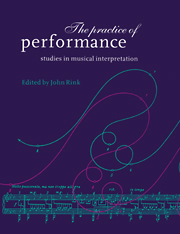Book contents
- Frontmatter
- Contents
- Preface
- PART ONE FUNDAMENTALS
- 1 What do we perform?
- 2 Expression in performance: generativity, perception and semiosis
- 3 Musical motion and performance: theoretical and empirical perspectives
- 4 Deliberate practice and elite musical performance
- PART TWO STRUCTURE AND MEANING IN PERFORMANCE
- PART THREE PERFORMANCE AS PROCESS
- Index
4 - Deliberate practice and elite musical performance
Published online by Cambridge University Press: 10 October 2009
- Frontmatter
- Contents
- Preface
- PART ONE FUNDAMENTALS
- 1 What do we perform?
- 2 Expression in performance: generativity, perception and semiosis
- 3 Musical motion and performance: theoretical and empirical perspectives
- 4 Deliberate practice and elite musical performance
- PART TWO STRUCTURE AND MEANING IN PERFORMANCE
- PART THREE PERFORMANCE AS PROCESS
- Index
Summary
Although millions of people learn to play musical instruments, relatively few succeed in reaching the standard of excellence that we call elite performance. The definition of elite performance proposed in this chapter radically differs from received opinion, which typically attributes the skills and accomplishments of a first-class performer to ostensible talents or ‘gifts’. The notion of talent is also invoked to explain ‘child prodigies’, the idiosyncratic interpretative styles and technical prowess of outstanding adult players, and the levels of performance sustained by excellent older musicians seemingly able to defy the effects of ageing. Most people would dismiss any claim that these various phenomena primarily reflect the result of acquired skills and training, for the idea that natural, innate constraints (i.e. talents) determine the level of performance that individuals can achieve is widely accepted.
Nevertheless, this flies in the face of compelling evidence both within and outside the realm of music. In athletics, for instance, the best performances have been improved upon throughout history (see Schulz and Curnow 1988), reflecting structural refinements and increases in the duration and intensity of training. Musical performance has seen similar developments. Tchaikovsky's Violin Concerto was deemed unplayable in his day (Platt 1966), whereas elite violinists now consider it a standard part of their repertoire. And according to Roth (1982: 23), the virtuoso Paganini would ‘cut a sorry figure if placed upon the modern concert stage’: his legendary technique was ‘superhuman’ only until appropriate systems of training were devised to acquire it more generally. As musical technique and training methods have become increasingly refined, the standards required for elite performance have risen commensurately.
- Type
- Chapter
- Information
- The Practice of PerformanceStudies in Musical Interpretation, pp. 84 - 102Publisher: Cambridge University PressPrint publication year: 1995
- 17
- Cited by

